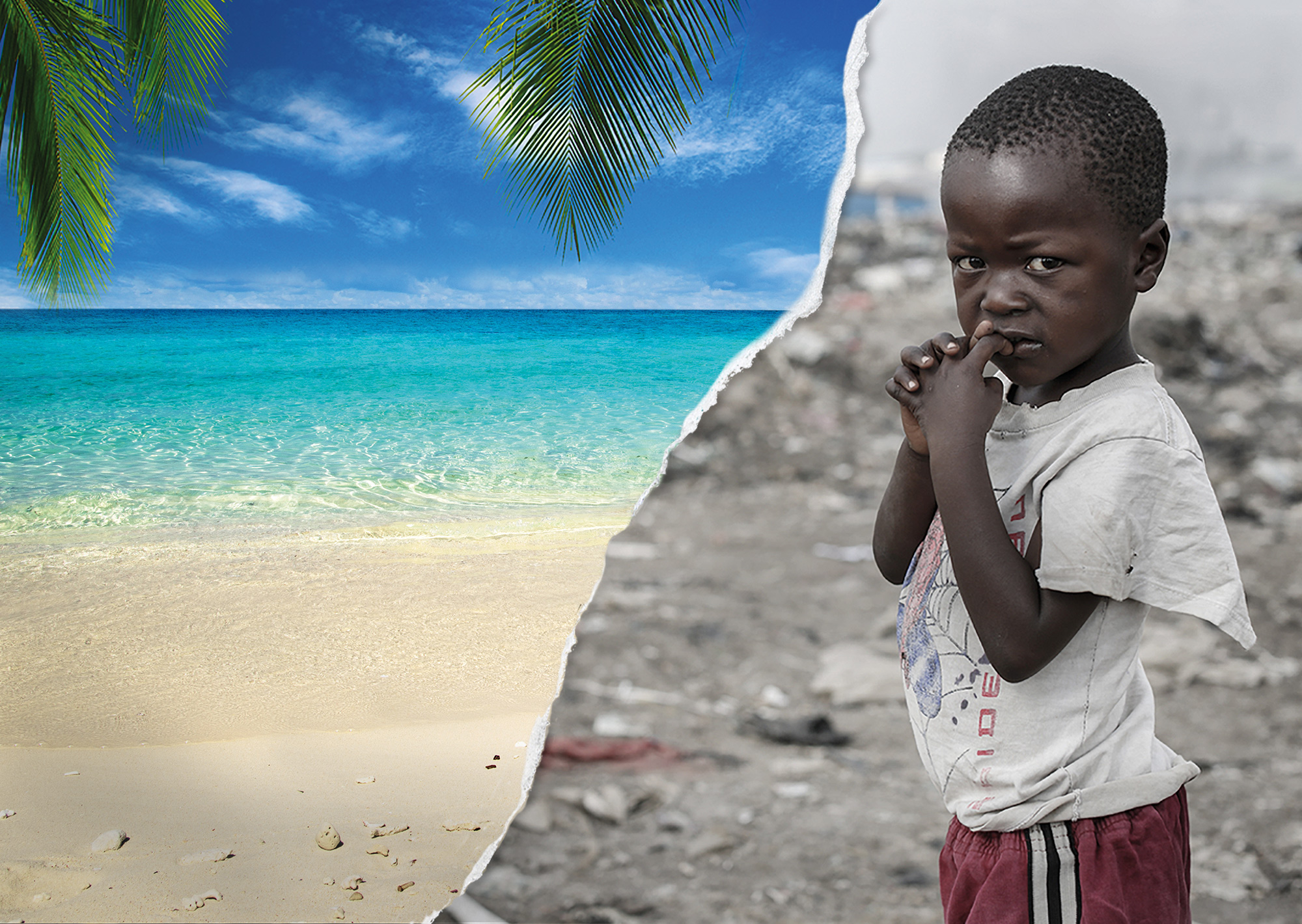- 4 min read
- Published: 21st January 2016
Two sides of the same story

Imagine a tax haven, and you might imagine an island with palm trees, yachts and pristine white sands. Some tax havens look like this, some are less glamorous. But however they look on the surface, underneath a very different picture can be found.
Tax havens are at the heart of a global system that allows multinational companies and wealthy individuals to avoid paying their fair share while 896 million people worldwide are trapped in extreme poverty, and seven out of ten people on the planet now live in countries where economic inequality is worse than it was 30 years ago. Tax havens deprive governments of the resources they need to provide vital public services, like health and education, and to tackle rising inequality.
While the super-rich benefit vastly from this global system, its devastating impact can be felt in some of the poorest communities in the world.

Above: The Jamaica Dump, Nairobi, Kenya – April 2014
When we met him, Morgan said he thought he was five years old but he wasn‘t sure. He was playing at a dump in the Mukuru slum in Nairobi while his mother worked, sorting through the rubbish. The local children often come here to scavenge for food scraps, or work alongside the adults. Morgan told us he wasn‘t at school as his family couldn’t afford it.
It’s a huge injustice, especially when you consider that Kenya is the fastest growing economy in Africa. While some progress is being made, too many ordinary people aren’t seeing the benefit. In fact, around 34% of Kenya’s population live in extreme poverty.
According to the World Health Organisation, there is only around two doctors for every 10,000 people . And for the people of the Mukuru slum, even basic services like sanitation, water and education are scarce.
Meanwhile...

In February 2015, leaked files revealed that a small number of rich individuals connected to Kenya were stowing away around $560 million in bank accounts in Switzerland. This is hidden, untaxed wealth - revenue that Kenya’s government needs to ensure that children like Morgan have a future.
This is just one example of a huge problem that’s happening around the world, not just in Kenya. The systemic use of tax havens by wealthy individuals and multinational companies is denying the poorest governments hundreds of billions in unpaid tax, and it’s holding back the fight against global poverty and inequality.
TODAY, JUST 62 BILLIONAIRES OWN THE SAME WEALTH AS THE POOREST HALF OF THE POPULATION.
Every year, the gap between rich and poor gets even wider – and it’s being fuelled by the use of tax havens. As much as $7.6 trillion of personal wealth is being hidden in offshore accounts, and it has a devastating impact on poorer countries.
As much as 30 percent of all African financial wealth is estimated to be held offshore, costing an estimated $14 billion (approx. €12.9bn/£9.7bn) in lost tax revenues every year.
This is enough money to pay for healthcare for mothers and children that could save 4 million children’s lives a year, and employ enough teachers to get every African child into school.
Then there are the vast profits made by corporations and stored in tax havens. While rich individuals can hide their wealth in tax havens, multinational companies can use them to shift profits from the countries where they do business.
It‘s estimated that tax dodging by multinational companies costs the world’s poorest countries at least $100 billion every year.
How the other half live

Barbara is a widow. She spends hours every day walking to collect water for her crops, so she can feed her two children. And when her husband was alive, she had to sell livestock to pay for his care. She never had the chance to go to school. If she had, she would have liked to be a nurse or a teacher. Barbara told us she felt like “a lost person”.
But Barbara knows that things could be different. If everyone paid their fair share of tax, we could have a chance to meet the basic needs of people living in poverty, give them control over their own lives and the opportunity to change their futures.

THE GENERATION TO END EXTREME POVERTY, THE GENERATION TO BUILD A FAIRER WORLD

Every day, kind and generous people are doing what they can to help change things for people facing poverty - and great strides are being made. In fact by 2030, we can end extreme poverty completely. To achieve this, we need a powerful and practical response. We need to make sure economic growth benefits the poorest people. If we’re going to end extreme poverty, we need to make sure global tax rules work for the many - not just the few. We all need to be part of the solution. And you can help right now, by signing a letter to the government calling for an end to tax havens. It’s time for change.
